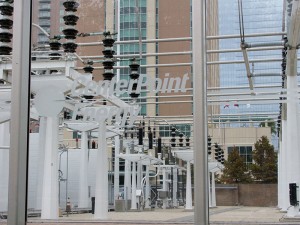How Much ‘Excess Revenue’ Did CenterPoint Energy Make?

Photo by Dave Fehling
CenterPoint's power station in downtown Houston.
The Texas Public Utility Commission meets Friday and will consider a report that says the Houston utility company, CenterPoint Energy, made almost $47 million in “excess revenue” last year. According to one utility watch-dog group, that’s too much.
CenterPoint Energy doesn’t sell electricity. It delivers it through thousands of miles of power lines. A charge is added to electric bills to pay CenterPoint.
“This is a regulated monopoly. They do not face competition,” said Thomas Brocato, a lawyer who works with the group Texas Coalition for Affordable Power.
Brocato is an expert on utility regulation and is a watchdog on utility companies. He said CenterPoint is, in essence, being allowed to make too much money.
“The result of that has been that customers in the Greater Houston area have paid more for electricity than they should have,” said Brocato.
The Texas Public Utility Commission sets a limit on much profit CenterPoint can earn for its investors. The report prepared by the commission’s staff found that last year, CenterPoint exceeded that “authorized return on equity” by almost $47 million.
The watchdog group suspects the amount might be even greater and cites CenterPoint’s own executives. The group points tocomments made by CenterPoint Executive Vice President Tracy Bridge to investors in New York earlier June 30th.
“The first thing I want to tell you is we’ve been consistently earning at or above our authorized return on equity, which is currently at 10 percent. For the last three years, we’ve been earning well in excess of that 10 percent authorized return,” Bridge told the investors.
Brocato, with the watchdog group, said Bridge’s comments were frustrating because he believes the Public Utility Commission will take no action to reduce those excess revenues.
“That frustration is exacerbated when you take into account the company’s plan to actually seek a rate increase in 2015,” said Brocato.
CenterPoint confirms that it is planning to ask for a rate increase next year. But how can it justify an increase if returns were “well in excess” of the authorized amount as the CenterPoint executive put it while talking to investors?
News 88.7 asked another CenterPoint Vice President, Paul Gastineau.
“Certainly our investors would like for us to earn our allowed return and beyond and that was the audience to which he (Bridge) was speaking,” said Gastineau.
Gastineau said that in recent years, earnings did increase but he said partly due to changes in tax laws.
But this year, he said that’s all changed. Gastineau said earnings are down. He said the Public Utility Commission will likely say to CenterPoint: There’s no reason for you to lower your rates.
“If we (the PUC) called you (CenterPoint) in for 2014 based on where you are now, we’d probably have to raise your rates not decrease them,” said Gastineau.